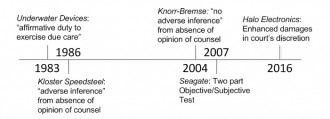
September 21, 2016
Federal Circuit Remands Issue of Enhanced Damages for Determination Whether this was an Egregious Case of Misconduct Beyond Typical Infringement
In WesternGeco LLC v. Ion Geophysical Corp., [2013-1527, 2014-1121, 2014-1526] (September 21, 2016), the Federal Circuit, on remand from the Supreme Court after Halo Electronics, Inc. v. Pulse Electronics, Inc., vacated the district court’s judgment with respect to enhanced damages, but reinstated its earlier opinion and judgment in all other respects.
The district court found that WesternGeco prevailed on the subjective prong of the two-part In re Seagate test, but not the objective prong, and denied enhanced damages for willful infringement. The Supreme Court removed the objective prong in Halo, so the Federal Circuit vacated and remanded the case for the district court to address enhanced damages under the new standard set forth in Halo, giving district courts greater discretion in awarding enhanced damages in cases where the defendant’s infringement was egregious, cases “typified by willful misconduct.”
The Federal Circuit said that the principal problem the Supreme Court had with with Seagate’s two-part test was that it requires a finding of objective recklessness in every case before district courts may award enhanced damages: “The subjective willfulness of a patent infringer, intentional or knowing, may warrant enhanced damages, without regard to whether his infringement was objectively reckless.”
If willfulness is established, the question of enhanced damages must be left to the district court’s discretion. However, nothing says that enhanced damages must follow a finding of egregious misconduct. As with any exercise of discretion, courts should continue to take into account the particular circumstances of each case in deciding whether to award damages, and in what amount. Section 284 permits district courts to exercise their discretion in a manner free from the inelastic constraints of the Seagate test.
The Federal Circuit said that after Halo, the objective reasonableness of the accused
infringer’s positions can still be relevant for the district court to consider when exercising its discretion. The Federal Circuit noted that the Supreme Court itself has said that district courts should exercise their discretion, taking into account the particular circumstances of each case,” and consider all relevant factors in determining whether to award enhanced damages.
The Federal Circuit said that on remand the district court must review the sufficiency of the evidence of willfulness as a predicate to any award of enhanced damages, mindful of Halo’s replacement of Seagate’s clear-and-convincing evidence standard with the “preponderance of the evidence standard.” Then the district court must consider whether enhanced damages should be awarded, and specifically whether the infringement constituted an egregious case of misconduct beyond typical infringement meriting enhanced damages under § 284 and, if so, the appropriate extent of the enhancement.




































